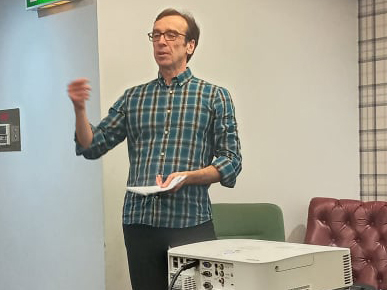The Confederation of Co-operative Housing (CCH) held its annual conference in St Helens, Merseyside, last month and put sustainability and climate change at the core of its agenda.
Rose Marley, chief executive of Co-operatives UK, in a video address, said the apex had seen a huge increase in inquiries about housing co-ops over the past 12 months, and is working with CCH on a joint membership offer. The two organisations have also successfully lobbied together fix a change to the tax system which had inadvertently punished the sector.
She also highlighted a successful £300,000 community share offer by Student Co-op Homes and said more work is being done “to empower the next generation with the tools of co-operation”. More needs to be done to making the co-op model an accessible route for people in need of housing, and to promote understanding of the model, she added.
CCH chair Blaise Lambert said the last year had been positive in terms of growth of CCH membership, with significant numbers of housing co-ops being set up – “something of a step change” – and new partnerships being formed, including one with insurance business One Broker, which has saved member co-ops significant sums be renegotiating their cover.
Communication within the sector has also been improved, including monthly online gatherings to share information, and CCH has published several guidance documents. There have also been updates to model society rules for different forms of housing co-op – and CCH is also working hard at developing new structures for growing the financing of the the sector.
With the affordability crisis in housing showing no sign of easing, the sector is facing fresh challenges with the gas price crisis putting pressure on domestic energy bills. Meanwhile, the climate crisis and the rush for net zero means a full scale transformation in how our homes are heated.
The conference – which saw delegates gather in person for the first time in two years – looked at how co-op housing models can help to drive this change and lead the way on innovations in retrofitting, district heating and circular economy construction methods.
David Connor, founder of the Liverpool 2030 SDG Hub –the world’s first UN Local2030 Hub, designed to make cities more resilient in line with the Sustainable Development Goals (SDGs) – said the world faces huge global challenges over sustainability and climate which can be translated to hyper local action by organisations like housing co-ops. “As we begin to emerge from Covid-19, climate change is everything,” he added.
“Don’t try to do everything but look at the assets you have,” he told housing co-op delegates. “Understand what you’ve got.”
Case studies on how housing co-ops can work toward the SDGs were presented, such as Findhorn Ecovillage, an experimental architectural community project in Moray, Scotland. Michaela Bygrave, an adviser at Community Led Homes, told delegates the village has renewable energy generation, onsite eco water waste treatment, and plots to grow organic food. It also combats social isolation and promotes neighbourhood resilience through a volunteer scheme, which gives every resident a helper. With so many residents not connected to television or social media, the village has also revived the tradition of the town crier, who gave important Covid updates during the pandemic.
Such ideas need to be scaled up if they are to bring wider change; Ms Bygrave looked to larger municipal initiatives such as the City of Amsterdam, which is working towards a circular city economy, reusing raw construction material that would normally be discarded after demolition.
Co-operative ideas can also inform circular economy projects like this, she said; and a people-centred housing system could also alleviate the the congestion and pollution problems associated with transport. Ms Bygrave pointed to the models being developed by UK charity Sustrans, which advocates a “15 minute neighbourhood” where people live within a 15 minute cycle ride of their work and schools.
The conference also had a presentation from Alex Towler, from Oxford-based architecture co-op Transition by Design, which specialises in community-led housing, urban research and cutting-edge design to deliver ecological buildings.
The co-op’s methods include the use of Passivhaus standards – developed in Germany to bring low energy, high comfort accommodation – as it looks for ways to “translate the SDGs into housing, practically and technically”.

Mr Towler said reducing energy use in housing is critical to the fight against climate change; at the moment, housing – including the energy used for construction – accounts for 39% of UK emissions, or 29% if only the energy used during occupancy is measured. And 63% of building site waste goes to landfill.
To cut housing emissions to zero, energy use to run a home must either be reduced or be produced by renewables. Efficiency technology can cut energy use by up to 90%, he said: in a home built to Passivhaus standards, a room can be heated with just four tea light candles – and household bills could drop from £1,000 a year to £100.
But comfort is as important as impact, he said, with studies showing that “most retrofits don’t bring savings until they ensure people are warm and comfortable”.
He set out guidelines for housing co-ops looking to achieve net zero emissions. They should start with a whole-house plan, and should work on the fabric – the outer shell of walls, roof, floor, windows, doors – first.
Insulation should be coupled with ventilation to avoid problems such as damp, which can result from poor retrofitting work. Mr Towler recommended the use of a retrofit coordinator to guide the project, following the new PAS 2035 standard which regulates the retrofitting industry.
These methods can work at scale, he added, with Passivhaus buildings including a skyscraper in Vienna.
Technologies include draft-free super insulation, which adds 30cm of insulation to the outside of buildings; triple glazing; and mechanical ventilation, which retains the heat from air pumped out of kitchens and bathrooms and transfers it to the fresh air being pumped in from outside.
In terms of energy generation, he said solar pV will pay for itself over a lifetime. Heat pumps – either ground or air-based – are also becoming more widely used; Mr Towler said advised housing co-ops to consider switching to this tech when their gas boilers reach the end of their lives. With an average price of £6,000, air heat pumps are twice the cost of a good boiler but they also have twice the lifespan, he said.
But if housing co-ops are to effectively drive sustainability, the housing co-op sector itself needs to be bigger. Breakout sessions at the conference included a case study of the sector’s growth in Merseyside, led by Phil Earl and John McGuigan of North West Housing Services (NWHS).
Formed in 2006, NWHS registered as a co-op in 2014 and provides services to its 34 member housing co-ops as well as a community land trust, four social enterprises and four leasehold management companies.

In Liverpool, it has 24 co-ops, running 1,576 properties; there are seven co-ops in Knowsley with 221 properties; the sector offers the lowest rents in the city. NWHS provides management services – finance, routine maintenance and planned maintenance.
The presentation highlighted ways to acquire sites for development – including the fostering of good relations with local authorities and housing associations, which might have derelict or unwanted sites for sale.
For example, Langrove CHC in Everton includes six new housies built on a site acquired from a housing association; and Lodge Lane East Community Housing in Toxteth has includes three new-build flats on a vacant site acquired from the council, developed with its co-op reserves and a capital grant from Homes England. The project also drew on the expertise of Manchester housing association Irwell Development Services.
Now it wants to acquire, refurbish and convert more derelict sites in the neighbourhood
“There’s a problem of a lot of private landlords in the area,” said Mr McGuigan. “Lodge Lane East wants to buy up any properties that come on the market and take them into co-op ownership.”
Mr Earl said: “We want to grow existing co-ops and establish new ones via the Breaking Ground hub” – a not-for profit, independent hub for community led housing in Merseyside. “We hope they can work with the local authority to identify available land.”
A similar hub in is getting off the ground in Manchester, he added,
“It’s hard to access a grant without someone helping,” he told delegates, “so find support. Look out for organisations looking to offload stock, or on the open market.”
Reserves members funds can be loaned to the co-op for purchases, said Mr Earl. “We don’t need FCA approval for this because we’re basically lending to ourselves.”
And local partnerships are important, he said. “It’s hard for co.-ops to work without an agent who knows the power structure in the local authority.
“You have to go out and look for properites, and be realistic and flexible in your goals – a lot of co-ops are very idealistic but need a reality check on what’s achievable in the real world.”
Financial advice is also vital before making any decisions, he warned, to keep a co-op out of financial trouble.
Co-ops can also use their circumstances to try to create new developments – for instance, when older residents have their children move out, they can be offered a smaller property within the co-op to downsize to, freeing up their old home for families. And co-op in areas which have seen soaring house prices can sell and relocate to cheaper parts of their cities, and using the saving to expand.
“But this has to be brought to membership,” said Mr Earl. “You have to make sure people are comfortable.”

CCH also handed out its annual awards at the conference. The winners are: Community through Digital Involvement – South Road Housing Co-op, Birmingham; Community through Covid – Brandrams Housing Co-op, London (shortlisted: Victoria Tenants Co-op, Birmingham; Young Co-operator of the Year – Cheshia Toka, Two Piers Housing Co-op, Brighton; Breakthrough Housing Co-operative of the Year – Plum Tree Housing Co-op, London (shorlisted– Stirchley Co-operative Development); Housing Co-operator of the year –Brian O’Hare – Huyton Community Co-op for the Elderly, Merseyside (shortlisted – Theresa Lyons – Senacre Housing Co-op and Helen Bartlett – Bunker Housing Co-op).